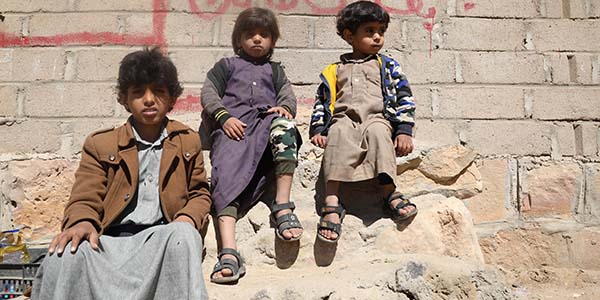Before coronavirus began to spread across the globe, health systems in Yemen were already burdened and at a breaking point after five years of relentless war. By December 2019, more than half of all health facilities had closed or were only partially functional, leaving 19.7 million people, including 10.2 million children, without adequate access to healthcare.
With no doctors to be found in nearly 20% of the 333 districts in Yemen,[i] children were dying at the hands of preventable diseases, including diarrhea, malnutrition and respiratory tract infections.[ii]
Despite the enormous challenges, Save the Children reaches the most vulnerable children across Yemen, making sure they have enough food to eat, can access healthcare, can continue their education, and are protected from violence. Since the beginning of the crisis, we’ve reached more than three million children with crucial support.
A global pandemic against the backdrop of war
By early May, the first case of COVID-19 had now been confirmed in the north of Yemen, in the capital Sana’a. Already two months since the World Health Organization has declared COVID-19 a pandemic, the worst-case scenario was unfolding. With coronavirus spreading across Yemen, a country already home to some of the most vulnerable children and families in the world, our worst fears were reality.
“After five years of war and with only half of the health facilities across the country fully functional, Yemen is simply not equipped to handle a full-scale outbreak,” said Xavier Joubert, Yemen Country Director for Save the Children.
A surge of coronavirus-like symptoms
In mid-May, officials in Yemen’s southern main city of Aden reported at least 385 people had died with Coronavirus-like symptoms over the span of one week.
Officials fear the numbers will only grow, despite the country’s shrinking health systems. Most private hospitals in Aden have closed--only treating those with no respiratory symptoms or fever.
Meanwhile, there are only 500 ventilators in Yemen, and just four labs for the whole country that do coronavirus testing.
“COVID-19 is pushing this country even further into the abyss,” said Joubert. “The surging deaths in Aden suggest that the virus is spreading far faster and further than the number of confirmed cases. Hospitals are closing down and patients are being turned away or left to die.”
COVID-19 knows no borders and it doesn’t discriminate – no country, rich or poor, is immune. And as the world grapples with the pandemic, children’s lives are being turned upside down.
It is the most at-risk children who will be hardest hit by this pandemic. Refugees and displaced children, street children, girls, and children with disabilities risk being even further excluded, isolated and neglected. For refugees and displaced children, it’s virtually impossible to practice social distancing or safe handwashing.
Save the Children is helping families and health workers get through this pandemic by delivering life-saving supplies, information and care. But we can’t do it without continued support.



